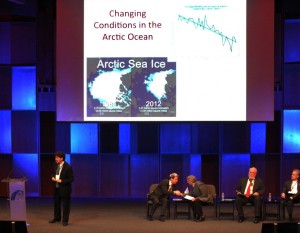
Representatives of the Arctic Council member nations wrapped up a meeting in Portland, Maine this week. American Ambassador David Balton, chairman of the senior Arctic officials, says they heard updates on top Council priorities, including black carbon reduction and resilience for Arctic communities.
The Arctic Council turned 20 last month. For the first decade of the Arctic Council’s existence, interest in it did not extend much beyond the Arctic nations. But Balton says now the world is paying attention to the region.
“And the Arctic Council has emerged as the premier international forum for dealing with the key issues of the Arctic region,” he said. “It has a broad mandate. It’s expanding its scope and reach in a number of ways. So I think there’s a growing awareness out there.”
Balton says the Arctic Council’s work on environmental monitoring and assessment is informing global efforts to contend with climate change, and he cited the example of the Polar Code that takes effect in January, to improve maritime safety.
“A lot of the information that went into building this new code to better regulate polar shipping, including Arctic shipping, came from information supplied by the Arctic Council,” he said.
As Balton spoke to reporters this morning, the power spot of international Arctic discussion had already shifted from Maine to Iceland, where the annual Arctic Circle Assembly is underway. It’s a gathering of some 2,000 people. In one of the first speeches there, U.S. Arctic Representative Robert Papp called for an international icebreaking force. Papp, according to High North News, said the icebreakers could be jointly operated for the common good, like the Enterprise, on Star Trek.
Liz Ruskin is the Washington, D.C., correspondent at Alaska Public Media. Reach her at lruskin@alaskapublic.org. Read more about Liz here.





